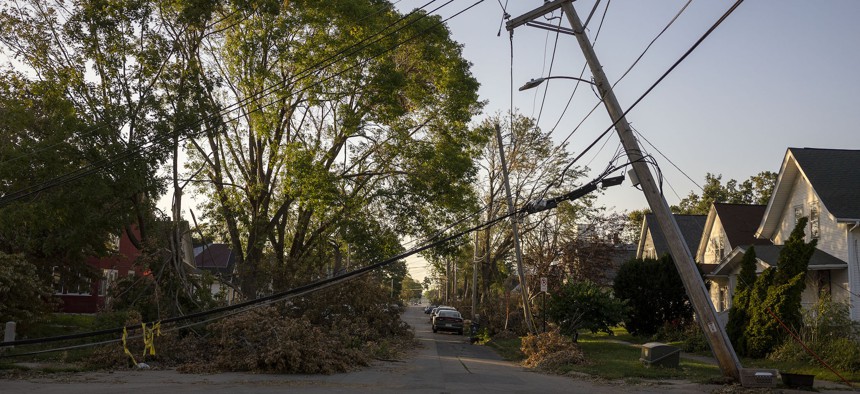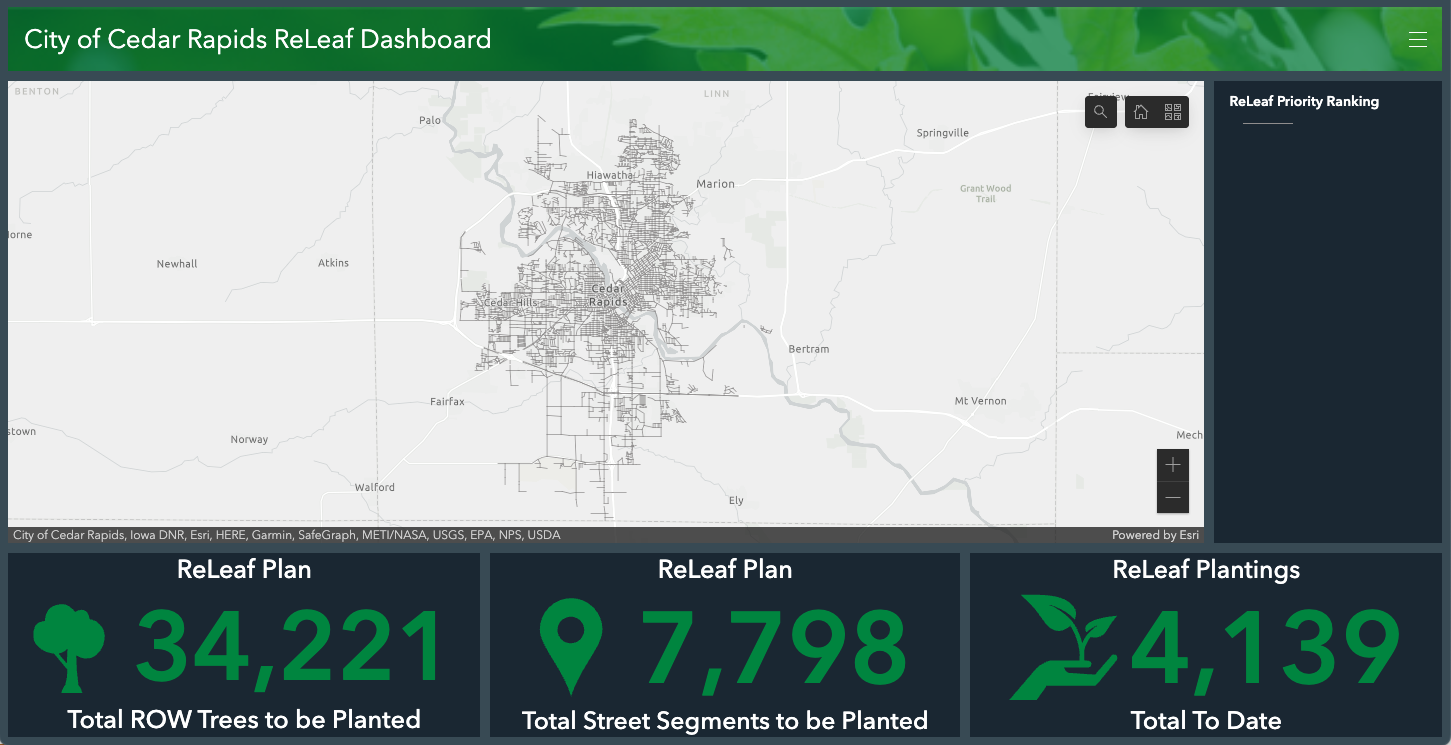A City Lost About 670,000 Trees. Now It Has a Plan to Replant Them

CEDAR RAPIDS, IA - AUGUST 16: A downed power line leans over a street in Cedar Rapids, Iowa on Sunday, August 16, 2020. A rare Derecho storm battered large sections of Cedar Rapids leaving people homeless and without power. KC McGinnis/For The Washington Post via Getty Images

Connecting state and local government leaders
After a destructive storm, the Iowa locality will spend $37 million to plant more than 42,000 trees over 10 years. “So much of the plan is intended to be replicable to other cities,” says a city official.
When Carole Teator purchased her property in Cedar Rapids, Iowa, it wasn’t for the house. She had fallen in love with the huge pines on the small wooded lot. So when a storm with up to 140 mph winds ripped through the area on August 10, 2020, snapping more than two dozen trees around her home, it was devastating.
“I really do still feel like I'm in mourning,” Teator said.
The storm destroyed about 670,000 trees across the city, reducing Cedar Rapids’ canopy cover by two-thirds. Classified as a derecho, the line of severe thunderstorms ravaged the city for nearly an hour. It took more than 10 months to clean up the damage.
Today, Teator is the program manager for ReLeaf Cedar Rapids, an ambitious $37 million plan to plant more than 42,000 trees in parks, rights of way and on private properties over the next 10 years.
Studies have shown that more of the country will experience extreme heat in the coming decades. Trees are a critical resource for providing shade as well as improving air and water quality. Like other cities around the country, Cedar Rapids is planting trees to reduce the city’s urban heat islands, which are often in lower-income or marginalized neighborhoods.
Cedar Rapids plans to budget $1 million annually and apply for grants to cover the remaining $27 million.
The plan was approved by the city council in February, just months before lawmakers passed the Inflation Reduction Act, the sweeping climate package that includes $1.5 billion for tree planting in cities nationwide.
The city is hoping to qualify for some of that funding, and it believes it can help other cities implement their own tree-planting initiatives.
“So much of the plan is intended to be replicable to other cities,” said Sandi Fowler, deputy city manager of Cedar Rapids. “And I've talked to a number of them and I said, ‘Take everything and apply your own GIS mapping, and get started on planting your streets. It's awesome.’”
To date, the city has replanted more than 4,000 trees, according to the ReLeaf Cedar Rapids online dashboard. The online tool allows users to see how many trees the city plans to replant in any particular area, as well as when to expect them.

A Gathering of Minds
ReLeaf Cedar Rapids took over a year and a half to hash out. The city began thinking about how to replace the lost trees within days—maybe even hours—after the derecho hit, according to Fowler.
While the city partnered with several experts on the plan, it welcomed public input from the get-go. Fowler said the city approached engagement through a variety of avenues. To help inform where trees were needed most, planners used the online tool Social Pinpoint to create a digital map that allowed residents to put a pin denoting where they had lost a tree, and whether they’d be up for replanting it.
Trees Forever, a local tree-planting nonprofit, has been a critical partner in the plan’s development and execution, Teator said. The organization has a long history of working with local leaders and landowners to plant trees and build community. Under ReLeaf Cedar Rapids, Trees Forever will educate and work with private landowners who want to replant.
Another approach was to poll residents about what they felt should be the most important principles to guide the replanting. Along with equity, the highest-ranking options included habitat preservation, climate action, resiliency and growing native species.
Equity
It’s not possible for the city to plant all 42,000 trees at once, nor would it be sustainable, Teator said. So to determine which areas will see new trees first, planners followed criteria based in part on the nonprofit American Forests’ tree-equity scoring system. That included looking at population density, what the canopy currently looks like, and where urban heat islands were located.
Given the public’s desire to see trees planted equitably, more weight was given to vulnerable neighborhoods, which might include areas with large shares of older people, low-income households, or residents who rely on public transportation or walking to get around, according to Fowler.
Biodiversity
Planners also focused on growing native plants, but included some non-native species that are particularly well adapted to the unique challenges of growing in an urban environment.
A 2016 tree inventory showed that most of the city’s trees were maples and ashes. But ash trees are vulnerable to a jewel-colored invasive beetle, so the city has made oak trees the project’s headliner, as they can support hundreds of different insects and caterpillars, and their acorns feed a variety of wildlife.
One of ReLeaf Cedar Rapids’ primary challenges is finding the supply to plant tens of thousands of trees, said Teator.
“No one anticipated that we were going to lose 670,000 trees, and so the nurseries were not stocked up for that,” she said. And while many of the area’s nurseries have plenty of some species, like maples, they may not have the species the city wants to cultivate.
“Obviously, many of them know what's happening and they're starting to build their stock, but it's going to take a few years to get to the numbers we need,” Teator said.
Updating Ordinances
To reach its goal of planting 42,000 trees, ReLeaf Cedar Rapids ideally needs the city to update some of its ordinances.
For example, the city typically plants trees 40 feet apart, but new research suggests that trees benefit from being closer together. Roots can intertwine to support each other and maybe even communicate, Teator said. The ReLeaf plan calls for trees to be planted no more than 30 feet apart, meaning the city needs to amend ordinances for its right of ways.
The plan also has implications for developers. Under current rules, developers need to plant one small tree for every tree that is removed during a project. But in an effort to more quickly restore the Cedar Rapids canopy, city officials are working to change that ordinance to require “inch-by-inch replacement,” meaning, for example, if a developer cuts down a tree with a 24-inch diameter, they would be responsible for planting two trees with 12-inch diameters.
As ReLeaf Cedar Rapids has developed, there’s been some pushback from residents, particularly from those whose properties were severely damaged by fallen trees during the derecho.
Teator understands the concerns, but says that trees take decades to reach maturity and are badly needed to defend against climate change.
“We're not doing it for ourselves,” she said. “We're trying to set up future generations to have the shade and the other benefits that trees provide, that I think people are going to really, really need more and more as this planet warms.”
Molly Bolan is the assistant editor for Route Fifty.

NEXT STORY: How Technology Can Reduce the Emotional Toll on the Public Safety Workforce



